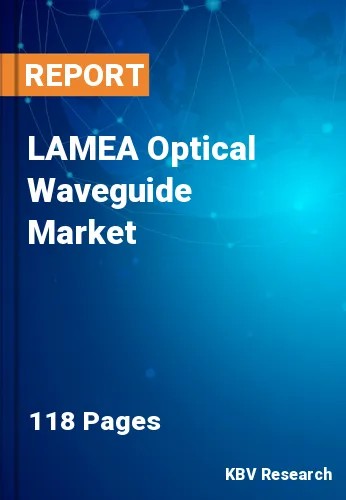The Latin America, Middle East and Africa Optical Waveguide Market would witness market growth of 9.0% CAGR during the forecast period (2023-2029).
The primary reasons propelling the market's expansion are the rising usage of electronic devices, data traffic, data center administration of sizable volumes of created data, and high-speed cloud computing. The demand for optical waveguides will increase as data centers embrace high-speed cloud computing more frequently. The increased volume of data traffic, along with the enormous amount of data still being produced by IT hubs and fast cloud computing systems, is arbitrarily causing the business to grow.
Optical waveguides are crucial for telecommunications and other high-tech applications. Optical waveguides are frequently used in fiber-optic communications and have many uses, including in the military & aerospace, telecommunications, medical, and other industries. Since they can accommodate high-power beams with little loss, channel waveguides are frequently utilized in optical fiber telecommunication applications. Over the projected period, growth is anticipated to be fueled by the rising global demand for high-speed data transport and communication services.
Brazil's most intelligent and connected city has been named Curitiba. The first Bus Rapid Transit (BRT) system, a network of bus lines that revolutionized how citizens got around the city, was also developed in Curitiba in 1974. The city also offers its citizens free internet access in public spaces. Fab Labs, city navigation apps, urban farms, and innovation clusters are just a few of the initiatives Curitiba is working on. To foster an atmosphere that is conducive to smart solutions that are in line with the fulfillment of the SDGs, Curitiba is promoting the smart city movement. These regional efforts to build smart cities are anticipated to assist market growth due to increased IoT adoption possibilities and regional 5G infrastructure.
The Brazil market dominated the LAMEA Optical Waveguide Market by Country in 2022, and would continue to be a dominant market till 2029; thereby, achieving a market value of $173.7 million by 2029. The Argentina market is experiencing a CAGR of 9.5% during (2023 - 2029). Additionally, The UAE market would display a CAGR of 8.7% during (2023 - 2029).
Based on Type, the market is segmented into Channel Waveguide and Planar Waveguide. Based on Interconnect Level, the market is segmented into Board-to-board & Rack-level Optical Interconnect, Chip- & Board-level Optical Interconnect and Metro & Long-haul Optical Interconnect. Based on Material, the market is segmented into Glass, Polymer and Semiconductor. Based on Propagation, the market is segmented into Single-mode and Multi-mode. Based on Industry, the market is segmented into Telecommunication, Data Center & High-Performance Computing (HPC), Industrial & Metrology, Medical, Aerospace & Defense, Consumer Electronics and Others. Based on countries, the market is segmented into Brazil, Argentina, UAE, Saudi Arabia, South Africa, Nigeria, and Rest of LAMEA.
Free Valuable Insights: The Worldwide Optical Waveguide Market is Projected to reach USD 9.9 Billion by 2029, at a CAGR of 7%
The market research report covers the analysis of key stake holders of the market. Key companies profiled in the report include Corning Incorporated, Sumitomo Electric Industries, Ltd., Yangtze Optical Fibre and Cable Joint Stock Limited Company, Fujikura Ltd., Prysmian Group, Furukawa Electric Co., Ltd., CommScope Holding Company, Inc., Sterlite Technologies Limited, Coherent Corp. and DigiLens Inc.
By Type
By Interconnect Level
By Material
By Propagation
By Industry
By Country
Our team of dedicated experts can provide you with attractive expansion opportunities for your business.

